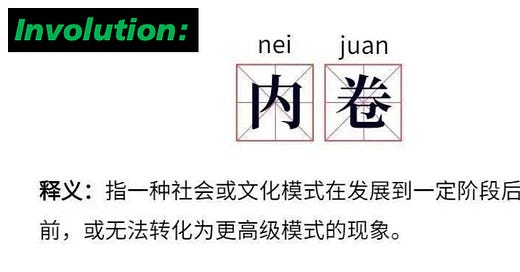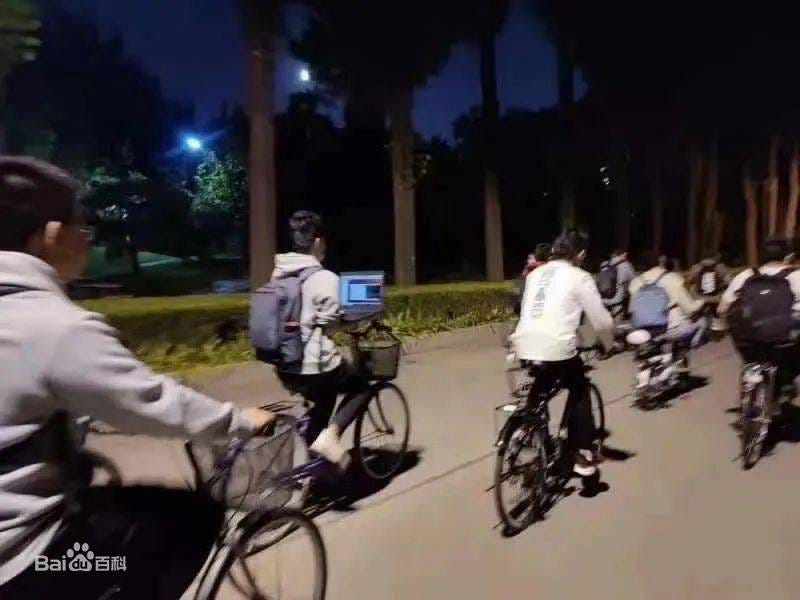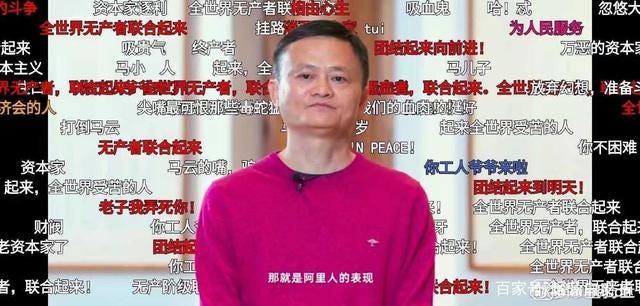The Future of China: How "内卷”(involution) Is Threatening the Country's Future
The Competition Trap: How China's Young People Are Being Driven to Despair by 内卷 (Involution)
Writing this article makes me feel like I'm in a language or literature class, where Chinese is incredibly creative in creating popular words while also having strong ideological ambiguity. In fact, many of the words popular in the Chinese circle today are difficult to find appropriate expressions in English. However, I believe that through today's content, any friend who can understand English can know the meaning of “内卷" and what impact it may have on China's future.
To confirm once again that there is no suitable expression for this word in English, I specifically compared it with Google Trends to confirm whether it is really rarely used, rather than my limited English level.
Forgive me for consulting with several friends whose native language is English. They all expressed that they could not find a suitable word to express the true meaning of “内卷" , and only the word "involution" is the closest to the problems that China is currently facing in all aspects of society.
The term "involution" was proposed by an American cultural anthropologist named Clifford Geertz during his research on Java Island. He found that the local agricultural life was limited by land resources, capital, and administrative barriers, which resulted in labor being continuously invested in limited rice production. This has led to a long-term cycle of simple repetition and no progress in local agriculture. Therefore, he called this phenomenon "involution".
You may have a question as to why this phenomenon cannot be described as "over-competition" and whether the author is exaggerating. At first, I did consider skipping this long explanation, but I found that the word "over-competition" does not fully reflect the harm and coercion brought about by "内卷".
Overall, the Chinese-style Involution is characterized by several features:
zero-sum or even negative-sum games. Compared with Evolution, Involution is self-repeating without progress. If we use mountain climbing as a metaphor, Evolution is like walking on a winding mountain road, constantly shortening the distance to the top, while Involution is constantly cycling at the foot of the mountain or halfway up, and can never reach the top.
Individual benefits decline: just like when you are watching a movie, people in the front row stand up to watch the movie without restraint, and eventually everyone in the cinema is forced to stand up to watch the movie. The movie that could be enjoyed while sitting has become a situation where everyone has to stand, and the benefits of each individual are damaged.
Irrationality and coercion: Compared with competition, competition is generally a neutral word with clear goals and positive and enterprising performance. Involution, on the other hand, shows that a certain circle pursues highly consistent interests and values, but the result is already predetermined. Everyone is betting everything for the last Noah's Ark ticket. Within their sight, this is their only choice.
Origin of "involution": the beginning of the COVID-19 pandemic.
The term "involution" became popular in China in the second half of 2020 due to the competition among elite students from top Chinese universities.
A photo of a student studying on a computer while riding a bicycle sparked discussion online, and a popular article titled "GPA is King: The Prisoner's Dilemma of China's Top Young People" further fueled the conversation. The author discussed the state of involution at Tsinghua and Peking universities, expressing concern that "these smartest young people in China are facing a universal dilemma: in extreme competition, success overwhelms growth, peers compete with each other, and they are exhausted."
It is important to note that the second half of 2020 was a critical period, as the COVID-19 pandemic was sweeping the globe, causing industrial and daily life disruptions in countless countries.
For China, which relies heavily on manufacturing and daily consumption, the social shutdown had a devastating impact (at that time, a business unit of the Alibaba Group where I was working had launched a large-scale project stoppage and layoffs).
Social shutdown, production stagnation, and travel restrictions have the earliest impact on the job market. Due to the uncertainty caused by the shadow of the global pandemic, many companies' original development paths have become full of great uncertainty.
This uncertainty has made companies no longer boldly expand, and they have cut projects with unclear prospects, reduced recruitment quotas for fresh graduates in previous years, and reduced company personnel to reduce expenses.
Even top students from China's elite universities such as Peking University and Tsinghua University have been worried about their future after graduation since 2020, as competition among the tens of millions of graduates from Chinese universities has become increasingly difficult.
Subsequently, the term "involution" began to spread to various industries, with the most prominent being white-collar workers engaged in intellectual labor in first-tier cities.
Due to the cliff-like decline in performance growth in various industries, countless companies have shouted slogans such as "opening up and reducing expenditure, overcoming the cold winter." This has led to even worse overtime environments, with 996 becoming the norm in many companies.
*996 means work from 9am to 9pm for 6days each week.
However, more overtime has not resulted in corresponding performance growth, resulting in a more solidified meaning of "involution," and a large number of young people have suffered from mental illness as a result.
The root cause of Involution, and reflection on economic development and urbanization.
Since the end of World War II and the birth of the Internet, there has been a rather exaggerated period of economic growth in human history, especially in China where the urbanization rate has grown from 18% in 1978 to 65% today, and GDP has grown from 367.9 billion to 121 trillion today.
However, the development of things always has inertia and termination. Chinese people who are accustomed to high-speed economic and income growth are at a loss and filled with frustration in the face of the sudden decline of the world economy.

In the past, China was committed to developing industry, improving scientific research, enhancing public welfare, building infrastructure, investing in education, developing real estate, globalizing trade, and promoting the internet. These efforts resulted in significant development dividends after several years, with everyone contributing to making the cake bigger.
However, the COVID-19 pandemic, the Russia-Ukraine conflict, and the energy crisis have disrupted this cycle. In particular, if we look at the changes in M2 issuance and debt on the US and China sides, the shadow of the 2009 economic crisis has not yet been shaken off, and the dream of unlimited growth has been shattered.
For a long time, what we have been doing is "optimizing the market" rather than "redefining the market" or "creating the market." There is an exception, which is that Steve Jobs did redefine the phone and greatly expanded the breadth and depth of the internet. However, no one has yet redefined computers or cars, even if new car makers are making a lot of noise.
Optimizing things can sometimes be uneconomical.
Lower-level optimization can be exciting, but at a higher level, it takes a huge effort to make even a little progress, and it is not exciting. The former optimization belongs to effective competition, while the latter optimization, even if there is some optimization, has a strong atmosphere of “Involution".
How serious is the "involution" phenomenon in China right now?
A large number of returned overseas Chinese or graduate students from prestigious universities are no longer choosing high-tech industries, but are instead joining the ranks of civil service exams. They hope to become a government "screw" that can be handled even by a high school student, in order to avoid getting trapped in the career "involution" and have a more relaxed life.
Some employees work longer hours but produce less, just to show their loyalty to the company and avoid being fired, even if their performance is poor. This has led to longer working hours for all colleagues.
Some job postings actually only require a bachelor's degree, but due to the overwhelming number of applicants, the job requirements are raised to a doctoral degree, yet these positions are still in short supply.
After major layoffs, internet giants have cut off projects that are not profitable, and the remaining employees have to voluntarily work overtime to keep their jobs.
Because of the large proportion of layoffs by internet giants, some small and medium-sized companies offer insulting low salaries to attract some of the elite applicants and thus block the employment opportunities of new graduates. Some talented individuals who refuse to compromise have remained unemployed until now.
Children have to attend countless after-school tutoring classes starting from kindergarten. Their resumes are so impressive that even someone who has been working for over 10 years like me feels inferior. Their resumes are filled with various competition results, English vocabulary, programming skills, horse riding, piano grades, and more.
Once a new internet project emerges, major companies immediately copy it. ChatGPT is a good example of this. There are no longer any new growth points in traditional businesses.
Misunderstood competition, young people escaping from the involution race.
In many contexts, the use of the term "involution" carries a strong sense of accusing competition, whether it is ineffective competition or benign competition.
Chinese young people unanimously understand it as "involution", and this sudden collective consciousness shift is very dangerous.
I still remember before 2020, the comments under Jack Ma's public videos were all calling him "Daddy Ma". Yes, it was just a few years ago that young people still had dreams of wealth. And now, when we look at Jack Ma's related videos again, those who used to call him "Daddy Ma" now call him "shameless capitalist" and "the scum of entrepreneurs". The change in the wind direction is so fast and thought-provoking.
Due to an increasing number of people recognizing the nature of Involution, young Chinese people have begun a collective exodus. However, the ways in which they are leaving are truly unexpected:
The government advocates for delayed retirement, but young people choose to resign and open Taobao stores or become self-media creators, without even paying social security fees.
The government has lowered loan interest rates in the hope that young people will take out loans to buy cars and homes, but instead, they choose to save money or repay loans early. As a result, many real estate companies have gone bankrupt in recent years.
The government encourages young couples to have more children, but young people are not even interested in dating. As a result, many kindergartens have closed due to a lack of new students.
When companies require overtime, young people born after 2000 stand up for their rights according to labor laws, and some even physically fight their superiors.
Car manufacturers launched unprecedented price reduction campaigns, but car sales in China have dropped in the first quarter.
Some universities have relaxed their exam requirements to encourage students to graduate early or start internships early, but young people are not interested and even feel that delaying graduation or not graduating is not a big deal.
Professor Wei Wuhui from Shanghai Jiao Tong University has a sharp criticism:
"To be frank, I am extremely disgusted with the current atmosphere of suppressing competition without distinguishing right from wrong, as if expecting that no competition is the ideal. However, young people today, faced with sudden uncertainty, assume that all competition and actions are meaningless internal competition scams.
Many things that used to be normal have become somewhat strange. If the result is good, you have won the competition, but if the result is bad, you are in a meaningless involution. Whether an action is a positive or negative action seems to depend not on the action itself, but on the outcome of the action?"
At last, will the phenomenon of "involution" disappear?
In the current situation, I don't think a few words can clarify the far-reaching impact of breaking away from the involution on China's future. I also don't expect young people to be moved by these questions. Who should take responsibility for this?
This scene reminds me of the story in "The Three-Body Problem." When the technological tree of human civilization was blocked by the Trisolarans' sophons, even with the united efforts of all humanity to build a space elevator and a space fleet, they were unable to directly confront the Trisolaran civilization. Is this behavior a kind of ultimate "involution" of human civilization?
Chinese people believe in the saying “天行健,君子以自强不息-Heaven is guiding, and gentlemen strive constantly." Pursuing progress is the main theme of human civilization, especially for hardworking Chinese people. The spirit of striving for excellence should not stop today.
Of course, empty slogans are useless. From an individual perspective, while getting rid of ineffective involution, one should also recognize the overall trend, understand where their industry stands in the trend, their position in the industry and company, and then choose a niche path for breakthroughs. Outside of involution, everyone should have their own sky.
In addition, I will continue to write an article on how the country should solve the current social involution problem from a more macro perspective.










